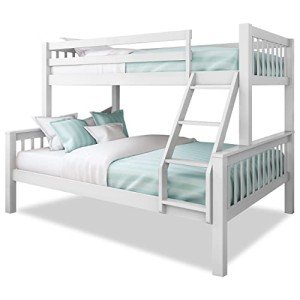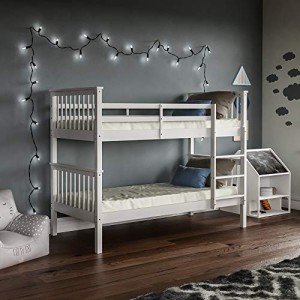9 Things Your Parents Taught You About Childrens Bunk Beds With Mattre…
페이지 정보
작성자Bernadette 댓글댓글 0건 조회조회 7회 작성일 24-12-12 15:32본문
 Childrens Bunk Beds With Mattresses Must Be Safe
Childrens Bunk Beds With Mattresses Must Be SafeBunk beds are an excellent solution to save space. But what's important to remember is that bunk beds that have stairs or ladders must be securely secured and made of durable materials to ensure security.
Also, mattresses should be low-profile to ensure the children's bunk bed mattress surface is at least 5 inches lower than the top of the rails. Some bunk beds have trundles that can hold three people, making them ideal for sleepovers or guests.
Size
Bedrooms for children are often designed with bunk beds to save space. By stacking the beds vertically, more floor space is available for other furniture such as desks and wardrobes. Bunk beds can also be utilized in shared rooms or dormitories to make space.
When selecting a bunk bed for your child, think about their age and ability to safely climb to the top of the bed. childrens bunk bed with storage beds should not be considered until your child reaches the age of six. Even then, you must follow the safety guidelines set forth by the manufacturer. These include sturdy railings, a sturdy ladder, and adequate height clearance from the ceiling.
The size of the mattress in the bunk bed is another aspect to take into consideration. Bunk beds can be found in twin or full size and must fit snugly within the bunk frame. The gaps can lead to an entrapment, which can compromise the stability. Choose a mattress made of innerspring, memory foam, or hybrid construction to offer the comfort and support you need for your children as they sleep.
Additionally bunk bed mattresses must be a minimum of 8-14 inches in thickness to comply with child safety guidelines. Mattresses that are too thin could potentially slip down or roll off the top bunk, which can be dangerous for young kids. You can also choose a bed that has an integrated ladder to make it easier for you to reach the top bunk.
Height
Bunk beds are an excellent option for rooms for children because they provide extra storage space and free up space on the floor. However, before making a purchase it's important to consider the size of the bed as this can affect the security and comfort of the mattress. For instance the bunk bed must be in compliance with British safety regulations and the rails should be at least 16cm higher than the mattress to prevent children falling out of the bed.
Be aware of the height of ceiling fixtures, such as lighting fixtures and fans when you are choosing the size of a bunk bed. These can impact the overall height. Also consider whether you plan to make use of a ladder or steps to access the top bunk, as these should be sturdy and strong or secured securely to prevent them slipping and posing the risk of.
It is important to select a mattress with a low profile, as this will permit the safety rails on the top bunk to be raised higher. This is important because the more thick the bed, the higher the mattress will be. This can block your child's vision and make it more difficult for them to get out of the bed.
Another factor to consider is whether you'll be using twin or full-size mattresses for the bunk bed. If you're looking for the most space, a twin over full configuration is ideal since it allows each child to have their own bed, while offering plenty of space for storage beneath. If you are planning to use a King-sized mattress on the bottom, it is best to consider specialist frames designed specifically for this type of configuration. They'll be more sturdy than the typical bunk frames for beds.
Weight
Bunk beds with mattresses are ideal for families with children sharing the same room. They can to maximize space by fitting two beds into the same room, while allowing for additional storage space with built-in storage drawers or cubbies.
When selecting bunk beds with a mattress, prioritize adherence to strict safety standards. This includes a design that features secure guardrails on the top bunk as well as a sturdy stairs or ladders that are securely attached to the frame with anti-slip elements. The slats on bunk beds should be spaced evenly to avoid entrapment.
If kids are sharing the top childrens cabin bunk beds, pay close attention to the bed's capacity for weight and make sure it can accommodate both of them without exceeding the limit. This is important because it can prevent the onset of structural flaws or issues that could affect the safety and stability of the elevated sleeping area.
Although it's tempting to let kids jump on their bunk bed (or even climb up the ladder during playtime) be aware that they don't yet have a sense of caution that would govern their behavior on a surface that is elevated. Children who are older than 6 are typically at a point where they are ready to sleep on the top bunk. However, you, as a parent, must determine if your child is ready.
When choosing a bunk bed that has a mattress, choose an all-foam mattress to limit disturbances in the night. Additionally, consider a mattress with cooling technology that keeps the childrens bunk beds with wardrobe bed cool and comfortable particularly during summer nights when the temperature rises.
Cooling
Bunk beds can be a stylish and space-saving sleeping arrangement, but it's not as simple as walking into a store and buying the first mattress you see. Kids bunk bed mattresses must have specific features to ensure a safe and sound sleep, especially for children sleeping on the top bunk. They should be thin enough to meet federal safety standards for fire, yet thick enough to prevent the child from falling off the top bunk. They must also be lightweight and low-profile so that they can fit into the frame.
When purchasing a bunk bed, you should consider its thickness and the material it is made of. In general, you should select an item that is 6 inches thick. This will ensure that the mattress won't rise above the height of the top bunk's security railing and a child is unable to roll out of the bed without getting trapped by the railing. The thickness of a bunk bed mattress is also crucial since it determines how much headroom your child will have on the top bunk.
When selecting the mattress for a bunk bed, you should take into consideration whether it is soft or firm. A soft mattress is more comfortable, however the firmer mattress will offer better support for the spine of your child's. You should also consider the amount of storage the mattress offers. A bunk bed with storage will help keep your child's room clean and organized. It may even help him or her be more productive in school.
Safety
Like any other furniture for children, bunk beds that have mattresses should be built in a way that is safe to prevent accidents and injuries. The first thing to do is to check the sturdiness of the bed by inspecting all the key structure points, such as the corners where the feet and bed base are attached to the frame. Check that all of them are securely secured and that there isn't any movement or instability at any of the points.
Another crucial step is to ensure that the foundations of your bunk mattress are strong enough to withstand the weight of your child as well as their sibling sleeping on top of it. You can test this by applying pressure on the bed from various angles to determine if it gives way or moves. If it does, it is not a good sign, and you will need to replace the mattress foundation.
Once the childrens double bunk beds bed is set, you should also take steps to keep the area around it clear of tripping hazards. This means ensuring that any furniture that isn't required for the bunk is removed away from the room. You should also ban jumping or rough play on the bunks. Also, ensure that only one child can sleep on the upper bed at one time.
 It's an excellent idea to get your children to practice removing toys from the space around their bed on a regular basis. This will prevent falling and suffocation dangers that could occur when kids are climbing up and down from the bunks. It is important to stress that these are rules that they must follow regardless of guests coming to visit for sleepovers.
It's an excellent idea to get your children to practice removing toys from the space around their bed on a regular basis. This will prevent falling and suffocation dangers that could occur when kids are climbing up and down from the bunks. It is important to stress that these are rules that they must follow regardless of guests coming to visit for sleepovers.댓글목록
등록된 댓글이 없습니다.

